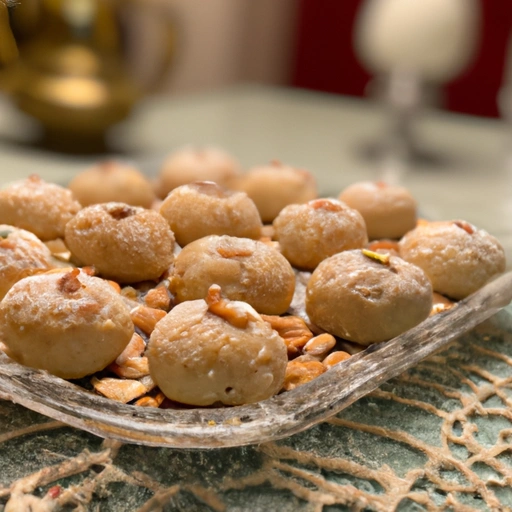Gharaiba
Gharaiba Recipe - Traditional Libyan Dessert
Introduction

Gharaiba is a traditional Middle Eastern cookie that is loved for its buttery and crumbly texture. These cookies are often enjoyed during special occasions and celebrations.
History
Gharaiba has been a popular dessert in Middle Eastern cuisine for centuries. The recipe has been passed down through generations, with each family adding their own unique twist to the classic cookie.
Ingredients
How to prepare
- Heat the butter and add sugar and flour. Beat until soft. Preheat the oven. Cut the mixture into gharaiba pieces and place them in a large flat pan. Place an almond in the middle of each gharaiba. Arrange the gharaiba in the pan and bake again.
Variations
- Add a sprinkle of cinnamon or cardamom for a spiced twist.
- Substitute almonds with pistachios for a different flavor profile.
Cooking Tips & Tricks
Make sure to beat the sugar, flour, and butter mixture until it is soft and well combined.
- Preheat the oven before placing the gharaiba in to ensure even baking.
- Be sure to place an almond in the middle of each cookie for added flavor and decoration.
Serving Suggestions
Gharaiba can be enjoyed with a cup of hot tea or coffee for a delightful snack.
Cooking Techniques
Baking
Ingredient Substitutions
Use margarine instead of butter for a dairy-free version.
- Use gluten-free flour for a gluten-free option.
Make Ahead Tips
Gharaiba can be made ahead of time and stored in an airtight container for up to a week.
Presentation Ideas
Arrange the gharaiba on a decorative platter and sprinkle with powdered sugar for a beautiful presentation.
Pairing Recommendations
Enjoy gharaiba with a glass of sweet Moroccan mint tea for a traditional pairing.
Storage and Reheating Instructions
Store gharaiba in an airtight container at room temperature. To reheat, place in a preheated oven for a few minutes until warm.
Nutrition Information
Calories per serving
Each serving of gharaiba contains approximately 150 calories.
Carbohydrates
Each serving of gharaiba contains approximately 20g of carbohydrates.
Fats
Each serving of gharaiba contains approximately 8g of fats.
Proteins
Each serving of gharaiba contains approximately 2g of proteins.
Vitamins and minerals
Gharaiba is not a significant source of vitamins and minerals.
Alergens
Gharaiba contains gluten and nuts (almonds).
Summary
Gharaiba is a delicious treat that is relatively low in calories but should be enjoyed in moderation due to its high sugar content.
Summary
Gharaiba is a delightful Middle Eastern cookie that is perfect for special occasions or as a sweet treat. With its buttery and crumbly texture, these cookies are sure to be a hit with family and friends.
How did I get this recipe?
I can't forget the first time I saw this recipe for Gharaiba. It was a warm summer day in the bustling marketplace of Marrakech, Morocco. I had been wandering around, taking in the sights and sounds of the vibrant city, when a sweet aroma wafted through the air and caught my attention.
I followed the scent to a small stall where an elderly woman was busy mixing ingredients in a large bowl. Her hands moved with a practiced grace, and her eyes sparkled with a hint of mischief as she worked. Intrigued, I approached her and asked what she was making.
She smiled warmly and replied, "Gharaiba. A traditional Moroccan cookie made with almonds, sugar, and spices. Would you like to learn how to make them?"
I nodded eagerly, drawn in by the promise of a new culinary adventure. The woman, whose name was Fatima, welcomed me into her makeshift kitchen and began to teach me the intricacies of making Gharaiba.
First, she showed me how to grind the almonds into a fine powder using a mortar and pestle. The fragrant scent of the nuts filled the air, mingling with the warm spices of cinnamon and cardamom that she added to the mix. As I watched her work, I realized that there was more to cooking than just following a recipe – it was a labor of love, a way to connect with others and keep traditions alive.
Fatima's hands moved with a speed and precision that only comes with years of practice. She shaped the dough into small balls and placed them on a baking sheet, then popped them into a wood-fired oven that crackled and hissed with heat.
As the cookies baked, she regaled me with stories of her own culinary adventures – of learning to cook at her mother's knee, of experimenting with new ingredients and techniques, of sharing meals with friends and family around a crowded table. I listened raptly, entranced by the magic of food and the power of shared experiences.
When the Gharaiba emerged from the oven, golden and fragrant, Fatima sprinkled them with powdered sugar and presented me with a plateful. I took a bite, savoring the buttery crunch of the almonds and the warm spiciness of the cinnamon. They were unlike anything I had ever tasted – a perfect blend of sweetness and spice, tradition and innovation.
As I thanked Fatima for her generosity and wisdom, she smiled and patted my hand. "Cooking is not just about following a recipe," she said. "It's about creating memories, sharing stories, and keeping traditions alive. Remember that, my dear, and you will never go hungry."
I left Fatima's stall that day with a full heart and a belly filled with Gharaiba. I carried her words with me as I traveled the world, collecting recipes and stories from every corner of the globe. And every time I make a batch of Gharaiba, I think of her and the magic of that warm summer day in Marrakech, when I learned that cooking is so much more than just putting food on the table – it's a way to nourish the soul.